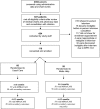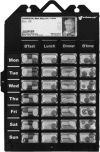Using a pharmacy-based intervention to improve antipsychotic adherence among patients with serious mental illness
- PMID: 19933540
- PMCID: PMC3122282
- DOI: 10.1093/schbul/sbp121
Using a pharmacy-based intervention to improve antipsychotic adherence among patients with serious mental illness
Abstract
Background: Similar to patients with other chronic disorders, patients with serious mental illness (SMI) are often poorly adherent with prescribed medications.
Objective: We conducted a randomized controlled trial examining the effectiveness of a pharmacy-based intervention (Meds-Help) in increasing antipsychotic medication adherence among Department of Veterans Affairs (VA) patients with SMI. We also examined the impact of Meds-Help on psychiatric symptoms, quality of life, and satisfaction with care.
Methods: We enrolled 118 patients from 4 VA facilities with schizophrenia, schizoaffective, or bipolar disorder who were on long-term antipsychotics but had antipsychotic medication possession ratios (MPRs) <0.8 in the prior year. Patients were randomized to usual care (UC; n = 60) or the pharmacy-based intervention (Meds-Help; n = 58). We reassessed adherence at 6 and 12 months, at which time patients completed Positive and Negative Symptom Scales (PANSS), Quality of Well-being Scales (QWB), and Client Satisfaction Questionnaires (CSQ-8).
Results: Prior to enrollment, Meds-Help and UC patients had mean antipsychotic MPRs of 0.54 and 0.55, respectively. At 6 months, mean MPRs were 0.91 for Meds-Help and 0.64 for UC patients; at 12 months, they were 0.86 for Meds-Help and 0.62 for UC patients. In multivariate analyses adjusting for patient factors, Meds-Help patients had significantly higher MPRs at 6 and 12 months (P < .0001). There were no significant differences between groups in PANSS, QWB, or CSQ-8 scores, but power to detect small effects was limited.
Conclusions: Congruent with prior studies of patients with other disorders, a practical pharmacy-based intervention increased antipsychotic adherence among patients with SMI. However, SMI patients may require additional care management components to improve outcomes.
Trial registration: ClinicalTrials.gov NCT00057135.
Figures
Comment in
-
The Meds-Help pharmacy-based intervention increases antipsychotic drug adherence, but not symptoms.Evid Based Ment Health. 2011 Nov;14(4):114. doi: 10.1136/ebmh.2011.100216. Epub 2011 Sep 30. Evid Based Ment Health. 2011. PMID: 21963709 No abstract available.
References
-
- Viguera AC, Baldessarini RJ, Hegarty JD, van Kammen DP, Tohen M. Clinical risk following abrupt and gradual withdrawal of maintenance neuroleptic treatment. Arch Gen Psychiatry. 1997;54:49–55. - PubMed
-
- Lacro JP, Dunn LB, Dolder CR, Leckband SG, Jeste DV. Prevalence of and risk factors for medication nonadherence in patients with schizophrenia: a comprehensive review of recent literature. J Clin Psychiatry. 2002;63:892–909. - PubMed
-
- Valenstein M, Copeland LA, Blow FC, et al. Pharmacy data identify poorly adherent patients with schizophrenia at increased risk for admission. Med Care. 2002;40:630–639. - PubMed
-
- Sajatovic M, Valenstein M, Blow F, Ganoczy D, Ignacio R. Treatment adherence with lithium and anticonvulsant medications among patients with bipolar disorder. Psychiatr Serv. 2007;58:855–863. - PubMed
-
- Sajatovic M, Valenstein M, Blow FC, Ganoczy D, Ignacio R. Treatment adherence with antipsychotic medications in bipolar disorder. Bipolar Disord. 2006;8:232–241. - PubMed



